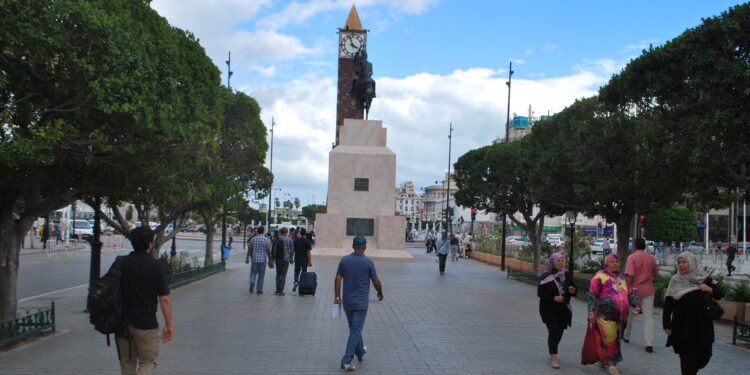Tunisia- The new checks law – according to which the authorities banned at the beginning of this month the Tunisians dealing with checks that do not have sufficient funds in the bank accounts based on it – sparked widespread controversy in the country, as some consider the step necessary to restore confidence in financial transactions, and others see it as a severe blow to the economy.
For years, checks were a means of guarantee adopted by citizens and owners of companies to buy on postponed batches due to the lack of liquidity and the deterioration of purchasing power, but a number of people were previously thrown in prison for accumulating their debts and their inability to pay the financial dues.
Since February 2, 2025, the new law has been criminalizing dealing with old checks, and the Tunisian authorities have imposed a new model of bank checks, through which to verify whether or not the owner of the check can be achieved whether the bank has a balance in the bank, through an electronic platform.
The electronic platform aims to enable the person who receives the check to verify before accepting it whether there is a balance in the account of the person who issued the check, which helps him to make the decision to accept the check or reject it based on this information, while bearing full responsibility for his choice.
https://www.youtube.com/watch?v=_ehla7yv9u
Re -considering the check
And the imposition of the new checks law on banks to conduct an in -depth study of the financial status of every person who requests a check book to assess his ability to cover his financial obligations, and banks monitor operations with risks and cash flows in his bank account that may exceed his ability to pay.
The work of the new checks comes after Parliament approved the law related to the revision of some of the provisions of the commercial magazine for checks on August 2, 2024, with the aim of re -consideration of the sukuk as an ال ال ال الم الم الم الم الم الم الم الم الم الم الم الم الم الم الم الم الم الراني المار المرار الرير الراني المار المرام المرار الرير الرير الرارين المرار الرارير re -consideration as a way to the sukuk, which the owners do not have assets.
The new check law is punished, the source of the instrument without a two -year prison is imprisonment if the amount exceeds 5 thousand dinars (1573.35) and the check was not passed through the electronic application to verify the balance, while the penalties were canceled on the issuance of checks without a balance that does not exceed 5 thousand dinars.
Economist Jamal Al -Din Al -Owaididi says that the amendment of the checks law comes in response to a number of complaints from individuals and owners of companies that were imprisoned in prisons because of their previous dealings with checks without balance, stressing that these checks were a national catastrophe to dismantle society.
Al -Owaididi adds in a comment to Al -Jazeera Net that the amendment of the law re -considered the check as an immediate payment, not to ensure the deferred payment, and he saw that the new law aims to enhance the safety and reliability of trading in the check, while raising the quality of banking practices and ensuring greater transparency in financial transactions, as he put it.
Al -Owaididi touched on the problems that were created by trading with checks without balance, as many people faced prolonged prison sentences because they were given checks without a bank balance and they were unable to pay their debts as a result of economic and commercial difficulties.
Despite his recognition of the possible effects of the new law on consumption and purchasing power, Al -Owaididi said that the effects will be limited because citizens or economic dealers can use what is known as the “bill of exchange”, which is a financial document that guarantees the creditor to obtain his dues by term.
Disratory repercussions
On the other hand, economist Reda Al -Shakandali said that “the adoption of the new check law will have catastrophic repercussions on the economy and individuals and companies,” appreciating that preventing trading in checks as a deferred means of payment will limit consumption, which is one of the most prominent growth engines.
He added in an interview with Al -Jazeera Net that dealing with checks is entrenched in the minds of Tunisians as a means of guarantee that is used from citizens and companies to facilitate payment on batches as a result of the difficult conditions for borrowing from banks, explaining that preventing transactions with sukuk without a balance weakens the purchasing power of the Tunisians.
He explained that the prevention of trading in old checks as a deferred means of payment will affect corporate transactions, which will cause the deterioration of its activity and the decline in economic growth, and then “the decline in the country’s self -resources from taxes to become the slogan of reliability (dependence on the self that the authority raises meaningless.”
He asked, “When citizens and companies are deprived of old checks and do not provide them with bank financing, what can they do?”, Considering that the economic fabric is mainly consisting of small and medium -sized companies facing great difficulties in financing due to the excessive state resorting to borrowing from banks.
He believes that the new check law, which criminalizes its use as a means of guarantee, may cause economic activity, especially in the local sectors directed to consumption, stressing that the Tunisian economy depends mainly on internal consumption to achieve economic growth and not on investment or export.
He explains that “immediate payment can only succeed in a refreshing economy in which banking institutions grant loans and financing consumption, but the reality is completely the opposite in Tunisia, as the central bank intends to raise interest so that banks do not grant consumption loans as a mechanism to reduce inflation.”



